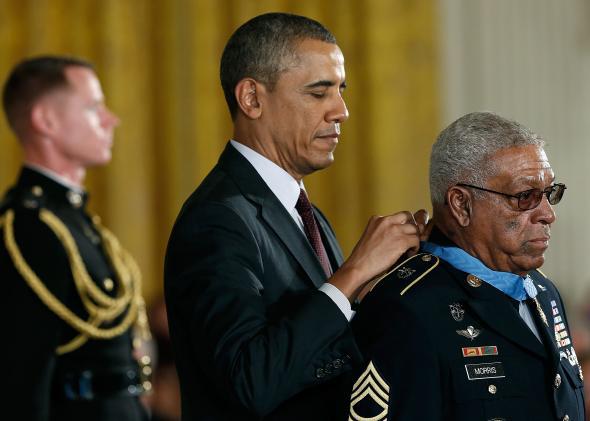President Obama moved to right old wrongs this afternoon in a ceremony that recognized 24 veterans, who were passed over due to racial or ethnic prejudice, with the Medal of Honor. The group, the single largest to receive the award since the last World War, includes veterans from WWII as well as Vietnam and Korea.
“No nation is perfect,” Obama said, “But here in America, we confront our imperfections and face a sometimes painful past, including the truth that some of these soldiers fought and died for a country that did not always see them as equal.”
Only three of the honorees, who were identified through a review that examined the records of minority servicemen who received a Service Cross for possible upgrades, are still alive today. All three served in Vietnam, via the Army’s Valor 24 website:
Master Sergeant Jose Rodela “is being recognized for his valorous actions on Sept. 1, 1969, while serving as the company commander in Phuoc Long Province, Vietnam. Rodela commanded his company throughout 18 hours of continuous contact when his battalion was attacked and taking heavy casualties. Throughout the battle, in spite of his wounds, Rodela repeatedly exposed himself to enemy fire to attend to the fallen and eliminate an enemy rocket position.”
Sergeant Santiago J. Erevia “distinguished himself May 21, 1969, while serving as a radio-telephone operator during a search-and-clear mission near Tam Ky City, in the Republic of Vietnam.”
Sergeant First Class Melvin Morris “is being recognized for his valorous actions on Sept. 17, 1969, while commanding the Third Company, Third Battalion of the IV Mobile Strike Force near Chi Lang. Then-Staff Sgt. Morris led an advance across enemy lines to retrieve a fallen comrade and single-handedly destroyed an enemy force that had pinned his battalion from a series of bunkers. Staff Sgt. Morris was shot three times as he ran back toward friendly lines with the American casualties, but did not stop until he reached safety.”
You can read through the biographies of all 24 recipients on the Army’s website here.
